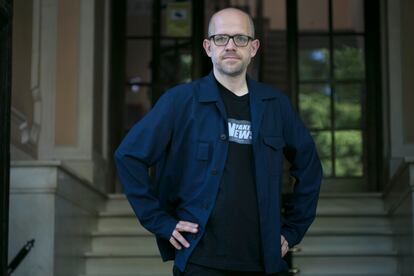Evgeni Mozorov, Belarusian writer and researcher Santi Burgos
The responses of Evgeny Mozorov (Soligorsk, Belarus, 37 years old) go on with hardly any silence for minutes. His is one of the current voices most clearly standing up against the power of Silicon Valley. Doctor of History of Science from Harvard University, Mozorov is one of the most prolific technological essayists of today. He was in Madrid last week at the invitation of the Aspen Foundation - an organization that aims to "promote leadership based on values" - and attends the event dressed entirely in black, proudly wearing a T-shirt that reads
fake news
. “Today is a suitable day to take it; it is a kind of signal ”.
This Belarusian living in Italy warns that we are "conditioned" to believe that Google's is the best way to manage information and denounces that European funds for reconstruction after the pandemic constitute "almost a
Marshall Plan
for the digital sector and the consultancy".
Question.
Last Tuesday, a good part of the main pages and services fell due to a failure in Fastly, a small company with just 1,000 employees.
What can we learn from this news about the way the internet has been built in the last 50 years?
Answer.
We should not draw overly ambitious conclusions.
They are very fragile structures that depend largely on private actors.
And the incentives of private actors, as is the case in all sectors, are not always in line with those of the public interest.
Debates about whether the existence of private operators who seek their benefit marry proper maintenance are frequent.
And that's the debate that should have been about digital infrastructures in the last 30 years.
The problem is that technology and the digital space have never been adequately subjected to political analysis.
Left and right have debates on many issues, but this extremely apolitical way of talking about digitization remains.
Q.
How is this achieved at a time when ideologies rule everything and seem irreconcilable?
Ideologies are inevitable.
There cannot be a democratic society without ideologies and I do not believe in the post-ideological technocratic debate in which things are talked about
as they are.
Things as they are never exist.
There has to be at least an understanding within political forces, at the level of political parties, unions and other forces about what the expectations of the digital society are.
Most of the political forces, in Spain especially, the debate goes through considering the platforms only as a means of communication.
For them, Facebook is good, because it allows them to connect with their voters or with their potential voters.
But that is totally ignoring that they cause major structural transformations, the fact that there is an economic policy linked to them or large sovereign investment funds that do not pursue the interest of society.
That has to be the reading.
The digital debate has stalled.
The arguments that can be heard today are the same arguments that could have been heard in 1995, but instead of talking about MySpace we talk about TikTok.
Q.
Do you have any idea how it should be done to be able to live with Google and Facebook and avoid them dictating how our lives should be?
A.
There is a difference between controlling these companies, which means tying their hands and making sure they do not go beyond the limits, and rethinking the way in which information is searched on the internet.
There is a tendency, both on the right and on the left, to think that, in some way, Google's is the best way to search for information
online
, to organize the world's knowledge.
On the right you will hear it say that it is fantastic, that it does what the public sector cannot do and that it does it for free.
The left will say that while they do a good job, they should pay more taxes.
Both positions presuppose that the best way to solve searches has been reached. And I do not see that there is evidence to believe that we are better off with Google organizing information about the local needs of citizens and neighborhoods.
We should see if there is a different way to organize information and manage ads, and what would it take to achieve these alternatives. A different system could be devised to collect data and make it available in one way or another, in which if you are a large US company you have to pay a much higher rate than if you were a local association, a citizen or a company. Neighborhood NGO. In this case, you could even receive a subsidy from the Government or any public service to organize that information and make it more accessible to citizens, since because you know the context, you know what the needs are, and you only need some resources.
We have been conditioned to believe that what this company offers us is the best, because it has the best engineers, but what it offers exists mainly because it uses its political power to prevent other options from arising.
It is not enough to control them and say "pay more taxes", because they paralyze the current model and, in a certain way, legalize it.
And I don't want to legalize it, I want to change it.
Q.
Do you think that big technology or power structures have become more powerful with the pandemic?
A.
Without a doubt. All the money that now comes from Europe to finance digitization, transport, education and everything else, is almost a
Marshall Plan
for the digital and consulting sector, because, deep down, there are no other actors in society that they are able to do something with that money. But once again, it's our fault because we haven't thought of that tool.
In a way, we assume that our needs can only be solved by a
startup
in Palo Alto.
[...].
The way in which the current digital economy works, due to access to infrastructures, for example, imposes a certain institutional model on all actors.
For me, it is obvious that it is not the optimal model.
Obviously, a different, more democratic system would lower costs, so I could innovate in my condition, not only as an entrepreneur, not only as a client, but as a teacher, as a citizen, as a student or whatever.
Q.
In your book
The madness of technological solutionism, you
argue that social networks, far from promoting democracy, have served as support on many occasions for authoritarian regimes.
What is the problem?
R.
I try not to enter into the debate of whether technology is an ally of authoritarian states or if it is their rival. In the same way, the same could be said of the press, for example. The question is to discern what kinds of technologies and infrastructure would make it harder for authoritarian governments to do what they do, and easier for activists to do what they do. It is a much more important debate.
The debate that exists now, on the contrary, broadly speaking, is whether, despite all the flaws that Google, Facebook and Twitter have, they can still be useful to activists. And the answer is yes, that's why they continue to use them with all the risks that exist. Taken together, they are useful to both activists and governments. It depends on where the governments are in their cycle and where the activists are in their cycle. If it is true that the Government of Saudi Arabia has managed to infiltrate the phone of Jeff Bezos, what can be expected of the activists?
You really have to ask yourself, is there anything these companies do that structurally compromises the ability of activists to do their job?
And the answer, of course, will be yes.
The fact that Facebook does not invest enough in content moderation and delegates so much to
bots
, robots and AI means that there is content that should be removed much more often, because algorithms and systems make mistakes.
When that happens before protests, that can make it very difficult to mobilize people.
Q.
The big names in technology, are they doing enough to preserve people's freedom?
No. They are doing enough to preserve their business models and maintain reputations not to become the same type of companies that were accused of supporting
Apartheid
in South Africa in the 1970s and 1980s.
What worries me is the opposite trend: we expect companies to be good and solve problems like climate change or inequality.
We expect Microsoft to solve cybersecurity problems that exist in part because everyone uses Microsoft products that have holes and gaps that are a consequence of Microsoft's business model.
That is, we perceive the guilty as those who can save us.
It's a wicked form of Stockholm Syndrome where you start to sympathize with the terrorist who has captured you.
Q. You are
wearing a T-shirt with the slogan
fake news
(false news).
Where did you get it from?
What is your opinion on this?
It saddens me when the hoax phenomenon is treated as something other than a direct consequence of how the digital economy and the public digital sphere are structured.
Obviously, the reason misinformation circulates so fast and so fast has to do with the fact that everything revolves around maximizing the number of interactions and clicks, because this is how those companies make money.
Therefore, when the debate and its possible solutions began, I was puzzled to see that many journalists and politicians advocated solutions that seemed disconnected from the nature of the problem.
Of course, the media can do more, and try to make people pay more attention.
But, obviously, if you disconnect the circulation of news and
online
attention
from the logic of digital advertising, you will never solve the problem of
fake news
.
"The West tends to underestimate Lukashenko"
P. In a somewhat more personal tone, how do you see the situation in Belarus, your native country?
R. It is a very difficult country.
Since I was 10 years old, the same leader [Aleksandr Lukashenko] has held power, who, obviously, is not a democrat in any case.
But I think politicians and activists in the West tend to underestimate their popular support.
And he has turned out to be a far smarter political actor than any of the authoritarian leaders of Eastern Europe.
Part of his survival goes through being able to face Russia against Europe, against the United States and against China and take money from all four.
I don't think the regime is about to collapse.
I didn't see it during last year's election, and I don't think it's about to go under now.
And the opposition itself is divided between those who are in favor of a closer alliance with Western Europe and North America, and those who want to have a closer alliance with Russia.
You can follow EL PAÍS TECNOLOGÍA on
and
or sign up here to receive our
weekly newsletter
.










